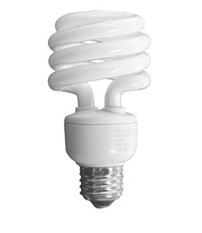Ways in Which You Can Go Green
Reducing your carbon footprint to save the environment is necessary to protect our environment.
Take some time to brainstorm an action plan to change your habits that harm the environment.
You can start by taking baby steps and getting into the habit of turning off lights and unplugging lamps when you leave a room. Also, turning off electronic devices when not in use CAN make a huge difference in the amount of CO2 released into our atmosphere.
Reducing your wasteful habits can also have a positive effect on your wallet!
If you are having a hard time getting started, the list of items below is an excellent way to get you started on the right track.
Fluorescent light bulbs:
Switch to compact fluorescent light bulbs (CFLs). Although they cost several times more upfront than regular incandescent light bulbs, they also last about ten times longer, which means that for every CFL you screw in, you’ll be saving eight incandescent light bulbs from landfills purgatory. Plus, you’ll save some serious cash in the long run. Because CFLs use 75 percent less energy.
Swapping one incandescent bulb for a CFL reduces carbon dioxide by 500 pounds a year; replacing 17 has the equivalent effect of taking one car off the road for a year.
Energy Star-rated appliances:
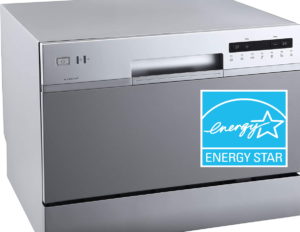 Purchasing energy-saving, Energy Star-rated electronic appliances and lighting can help slash a third off your electric bill.
Purchasing energy-saving, Energy Star-rated electronic appliances and lighting can help slash a third off your electric bill.
Improving your home’s energy efficiency could even earn you tax credits from Uncle Sam.
Paper Not Plastic:
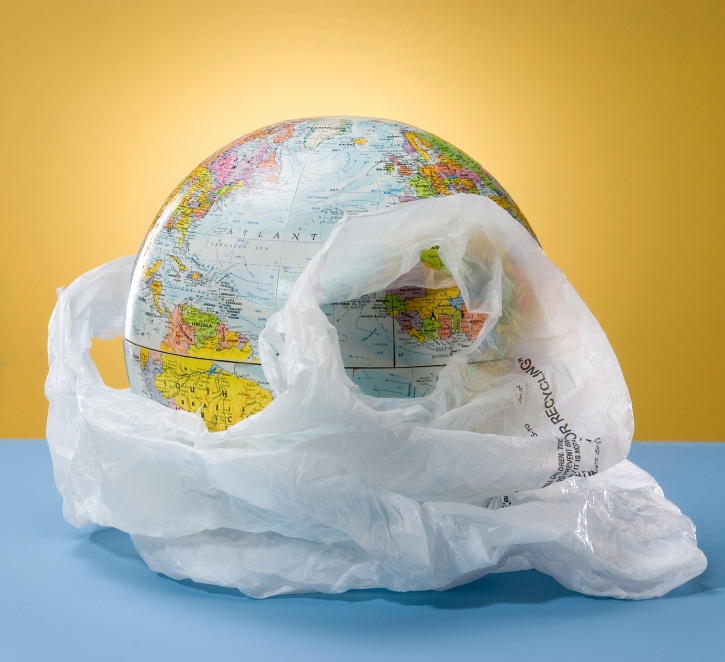 Because petroleum-based plastic isn’t biodegradable, it’s sure to outlive you by about a millennium or so years.
Because petroleum-based plastic isn’t biodegradable, it’s sure to outlive you by about a millennium or so years.
Each year, thousands of marine animals, including the endangered leatherback turtle, choke to death on plastic trash that they mistake for snackable morsels.
Our love for disposable plastic items has also bred a swirling vortex of plastic trash the size of Texas in the North Pacific Ocean. It’s not surprising when you consider that Americans run through about 100 billion plastic bags annually.
Americans use an average of 365 plastic bags per person per year, using up an estimated 12 million barrels of oil. Use recycled bags instead.
No Soliciting:
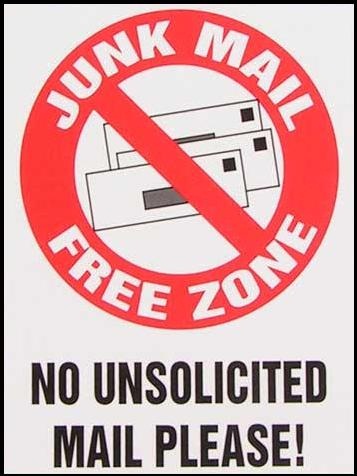 Deforestation is responsible for 25 percent of all carbon emissions released into the atmosphere through the burning and cutting of 100 million trees per year for junk mail.
Deforestation is responsible for 25 percent of all carbon emissions released into the atmosphere through the burning and cutting of 100 million trees per year for junk mail.
Save old-growth forests by opting out of paper catalogs and other paper options and browsing online instead.
Why do you think Al Gore invented the Internet?
To shed those extra 41 pounds of junk mail the average American chooses to receive each year.
Remove yourself from the direct-mail mailing lists. Anyone who wants to reduce the amount of prospect marketing mail they receive may register for the mail suppression service called DMAchoice provided by the Association of National Advertisers (ANA), which is independent of the United States Postal Service. You can also visit PaperKarma® – The Stop Junk Mail App.
Buy Locally Grown Produce:
 North American produce typically travels a minimum of 1,500 miles.
North American produce typically travels a minimum of 1,500 miles.
Grapes can clock 2,143 miles cruising from vineyards in Napa Valley to supermarket aisles in Chicago, gobbling up barrels of crude oil and spewing pollutants and greenhouse-gas emissions in their wake.
By buying produce locally, whether it’s through the farmers’ market or your local organic grocery store, you reduce your “food miles.” The distance your food travels to get from the farm to your plate. Now that’s fresh.
Reduce, Reuse, and Recycle:
 It’s better to reduce your consumption than reuse something, and it’s less environmentally taxing to reuse a product than to have it recycled.
It’s better to reduce your consumption than reuse something, and it’s less environmentally taxing to reuse a product than to have it recycled.
Separating recyclables from your regular trash, which barely takes any effort, is a no-brainer, of course; recycling aluminum, for instance, takes as little as 5 percent of the energy we’d need to manufacture virgin aluminum.
Renewable “fuels:”
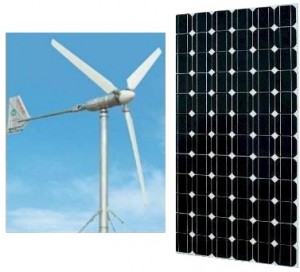 Low-impact sources such as wind, solar, and hydroelectric power reduce our dependence on coal-burning power plants, a significant source of greenhouse-gas emissions. And because harnessing the power of renewable “fuels” such as sun and wind are free, your electric bill is likely to scale down because of the reduced price of wholesale electricity.
Low-impact sources such as wind, solar, and hydroelectric power reduce our dependence on coal-burning power plants, a significant source of greenhouse-gas emissions. And because harnessing the power of renewable “fuels” such as sun and wind are free, your electric bill is likely to scale down because of the reduced price of wholesale electricity.
Energy Vampires:
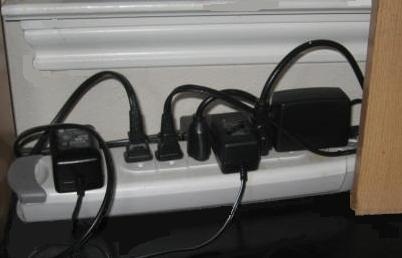 Household appliances plugged into wall sockets drain power all hours of the day and night, even after you’ve switched them off.
Household appliances plugged into wall sockets drain power all hours of the day and night, even after you’ve switched them off.
Americans pay $1 billion a year to power televisions and other electronic devices. Even when switched off. Other sleeper agents of the electric undead consume 1,000-kilowatt-hours a year per household while in standby mode: your toaster, coffeemaker, hairdryer, P.C., printer, cable box, and cell phone charger.
You don’t have to live in a constant state of fear. Forever searching through your home for that one appliance you forgot to unplug.
Just plug adjacent equipment into power strips with surge protectors, and before you crawl under the safety of your covers-or head out to work-simply flip the switch.
Household chemicals:
 An average of 200 industrial compounds, pollutants, and other chemicals, for instance, were recently discovered in the umbilical-cord blood of newborns. (These included seven dangerous pesticides, some of which were banned in the U.S. more than 30 years ago.)
An average of 200 industrial compounds, pollutants, and other chemicals, for instance, were recently discovered in the umbilical-cord blood of newborns. (These included seven dangerous pesticides, some of which were banned in the U.S. more than 30 years ago.)
We’re serving our kids potent chemical cocktails even before they’re born.
Pesticides have been implicated in causing several diseases such as Parkinson’s disease, infertility, brain damage, and cancer.
So ditch the poisons and choose natural, non-toxic cleaners and equally effective methods of cleaning and corralling pests.
You probably already have what you need in your kitchen to get started.
The selection of organically grown food will also cut out pesticides from your diet.
Support Green:
Trees absorb heat-trapping carbon dioxide, hold the soil together to prevent landslides, and provide a rich habitat for diverse plants and animals.
Choose furniture made from eco-friendly sources such as sustainably managed forests, bamboo, and reclaimed wood. Buying vintage wherever possible, rather than adding something new into the waste stream, is always in style.
Also, looking for furniture that is durable and likely long-lived-you’ll save money on replacements in the future and prevent more wasted materials from winding up in the landfill. And, if for some reason, that dresser or dining table no longer suits your needs, something in fine shape will always have takers via Craig’s List, eBay, Nextdoor, or Freecycle. Amongst several other websites.
Window Film:
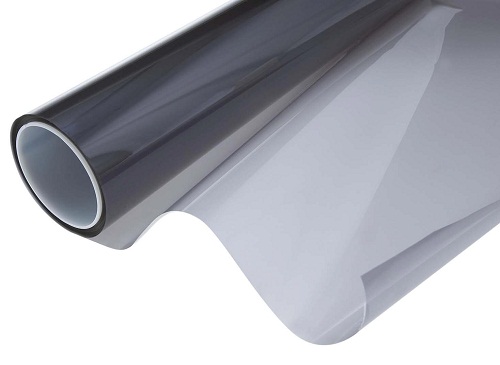 President Bill Clinton announced two new partnerships to make green products more affordable and accessible to city governments and consumers across the United States.
President Bill Clinton announced two new partnerships to make green products more affordable and accessible to city governments and consumers across the United States.
In response to growing demand, Clinton Climate Initiative will extend its programs and purchasing consortium, offering lower-cost green products from 25 manufacturers to 1,100 cities in the U.S. Conference of Mayors.
Installation of Solar Gard window film is included under the Energy Efficiency Building Retrofit Program, designed to help public entities lower their energy consumption.
Solar Gard window film can be measured to fit any glass door or window.
Now, all public organizations committed to reducing their carbon footprint can efficiently and cost-effectively fit Solar Gard window film into an overall strategy to reduce CO2 emissions. Because Solar Gard rejects solar energy, less energy is used to keep the interior temperature comfortable. Our Solar Gard window film provides an ideal solution for reducing your energy bill and keeping more money in your pocket.
Saving Every Last Drop:
 Installation of low flow fixtures is an inexpensive way to modify water usage and see easy-to-quantify results.
Installation of low flow fixtures is an inexpensive way to modify water usage and see easy-to-quantify results.
Other good starter projects include identifying and fixing leaks, changing processes that use excessive amounts of water, and training employees and apartment residents to report water-wasting situations within the facility.
Develop a baseline measurement of your water usage. Use water bills and meters to measure amounts of water consumption. Water meter available online.
California Incentives-Policies for Renewables & Efficiency
Reducing your carbon footprint is a necessary action to have an impact on saving our environment for generations to come.

